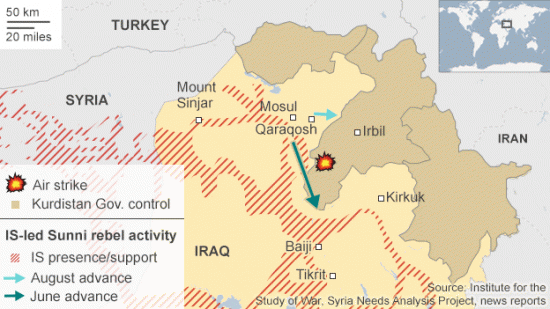 IRBIL, Iraq — The U.S. unleashed its first airstrikes in northern Iraq against militants of the Islamic State group Friday amid a worsening humanitarian crisis. The extremists took captive hundreds of women from a religious minority, according to an Iraqi official, while thousands of other civilians fled in fear.
IRBIL, Iraq — The U.S. unleashed its first airstrikes in northern Iraq against militants of the Islamic State group Friday amid a worsening humanitarian crisis. The extremists took captive hundreds of women from a religious minority, according to an Iraqi official, while thousands of other civilians fled in fear.
Many of America’s allies backed the U.S. intervention, pledging urgent steps to assist the legions of refugees and displaced people. Those in jeopardy included thousands of members of the Yazidi religious minority whose plight — trapped on a mountaintop by the militants — prompted the U.S. to airdrop crates of food and water to them.
American planes conducted a second airdrop of food and water early Saturday for those trapped in the Sinjar mountains, said Pentagon chief spokesman Rear Adm. John Kirby. Escorted by two Navy fighter jets, three planes dropped 72 bundles of supplies for the refugees, including more than 28,000 meals and more than 1,500 gallons of water, said Kirby, who spoke from New Delhi during a trip with U.S. Defense Secretary Chuck Hagel.
The extremists’ “campaign of terror against the innocent, including the Yazidi and Christian minorities, and its grotesque and targeted acts of violence bear all the warning signs and hallmarks of genocide,” said U.S. Secretary of State John Kerry. “For anyone who needed a wake-up call, this is it.”
Underscoring the sense of alarm, a spokesman for Iraq’s human rights ministry said hundreds of Yazidi women had been seized by the militants. Kamil Amin, citing reports from the victims’ families, said some of the women were being held in schools in Iraq’s second-largest city, Mosul.
“We think that the terrorists by now consider them slaves and they have vicious plans for them,” Amin told The Associated Press. “We think that these women are going to be used in demeaning ways by those terrorists to satisfy their animalistic urges in a way that contradicts all the human and Islamic values.”
For the U.S. military, which withdrew its forces from Iraq in late 2011 after more than eight years of war, the re-engagement began when two F/A-18 jets dropped 500-pound bombs on a piece of artillery and the truck towing it. The Pentagon said the militants were using the artillery to shell Kurdish forces defending Irbil, the capital of Iraq’s autonomous Kurdish region, and home to a U.S. consulate and about three dozen U.S. military trainers.
Later Friday, the U.S. launched a second round of airstrikes near Irbil, U.S. officials said. The officials, speaking on condition of anonymity because they weren’t authorized to discuss the strikes publicly, said unmanned aircraft hit a mortar and four Navy F/A-18 fighter jets destroyed a seven-vehicle convoy.
The U.S. State Department warned U.S. citizens against all but essential travel to Iraq and said those in the country were at high risk for kidnapping and terrorist violence.
Expanding from their stronghold of Mosul, the militants have captured a string of towns and Iraq’s largest hydroelectric dam and reservoir in recent weeks. Ethnic and religious minorities, fearing persecution and slaughter, have fled as their towns fell.
Many had taken refuge in the Khazer Camp, set up near Irbil, but it was empty Friday as nearby fighting prompted families to flee once again.
Some made their way by car or on foot to Irbil; others were unaccounted for amid the sea of fleeing people. According to the U.N., more than 500,000 people have been displaced by the violence in Iraq since June, bringing the total this year to well over 1 million.
In Irbil, hundreds of uprooted men crowded the streets of a Christian-dominated neighborhood, expressing relief at the news of U.S. airstrikes.
Nazar, one man lingering outside a bare-bones building-turned-shelter, fled his mainly Christian town of Hamdaniya on Wednesday, when their home began to shudder from the blast of nearby mortar fire.
“We want a solution,” said Nazar, who spoke on condition he be identified only by his first name, fearing his family’s safety. “We don’t to flee our homes and jobs like this. What is our future?”
In contrast to Washington’s decision to invade Iraq more than a decade ago, both the airdrop and the authorization of military action against the Islamic State group were widely welcomed by Iraqi and Kurdish officials fearful of the militants’ advance.
“We thank Barack Obama,” said Khalid Jamal Alber, from the Religious Affairs Ministry in the Kurdish government.
NY Post
